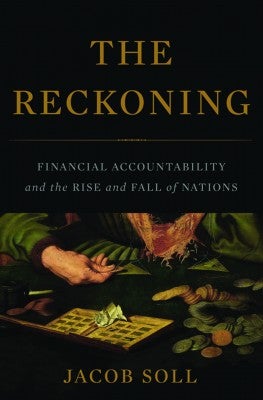The Case for Celebrating Accountants
For USC’s Jacob Soll, it’s time good accountants get the respect—and historical spotlight—they deserve.
Jacob Soll packs up to leave a café in West Los Angeles, and suddenly stops. He forgot something: his receipt.
After all, his snack was a business expense, Soll says, hailing a server. “You need to think like an accountant,” he adds.
And he always does. For Soll, 46, tracking money is about more than staving off a tax audit. “Accounting is the hidden structure behind our entire lives,” he explains. In other words, it’s an accountant’s world; we just live in it.
 In 2014, the scholar of accounting and MacArthur “Genius Grant” recipient published The Reckoning, a cultural history about the craft of crunching numbers and how openness in bookkeeping is crucial to government. The book earned widespread acclaim.
In 2014, the scholar of accounting and MacArthur “Genius Grant” recipient published The Reckoning, a cultural history about the craft of crunching numbers and how openness in bookkeeping is crucial to government. The book earned widespread acclaim.
“Accounting is a very lofty idea,” says Soll, professor of history and accounting at the USC Dornsife College of Letters, Arts and Sciences and the USC Leventhal School of Accounting. “It’s about balance, transparency and things making sense.”
Here are a few of his thoughts about the philosophy of good accounting and why accountants deserve rock-god status:
A Blueprint for America
People built countries with accounting. Benjamin Franklin was obsessed with it. He kept account books. He wrote his autobiography in a ledger on the debit side. He wrote a book of moral accounts. He wrote about how important accounting was and came up with a scheme to teach accounting to all Americans. America was built on accounting.”
The High Cost of Financial Stability
“Countries that have clear accounting, like Britain, have better long-term prospects. The U.S. does not have good accounting. And the American economy has been destabilized twice in the last 20 years by accounting scandals—the Enron, WorldCom and Arthur Andersen scandal in 1999, and the economic crash in 2007–2008, which had a lot to do with how mortgage bundles were valued and with individuals who were taking out mortgages they couldn’t understand or afford.”
Is God Running the Numbers?
“In Dutch and Old English, accounting ledgers were called ‘reckoning books.’ In the Bible, God is the final accountant who balances the books of life and death. He tallies your sins and does the reckoning and decides whether you go to heaven or hell. God is a big-time accountant.”
The Elephant in the Room
“No one wants to talk about accounting, because that’s where the books are; that’s where the secrets are. But we need some clarity. Everyone gets audited—you figure out what is wrong and then you fix it. If you want to have an economy that grows and works, you need competent financial management mixed with transparency, competent bookkeeping mixed with auditing. If you want to reform yourself, the tool you use is accounting.”
More Than Bean Counters
“There are no accounting leaders, and there should be. Accountants need to be involved in culture, they need to read, and they need to explain to people what accounting is. They can’t just keep the books. Benjamin Franklin saw accounting as part of a leadership culture. It should be on everyone’s lips when there’s a problem.”
